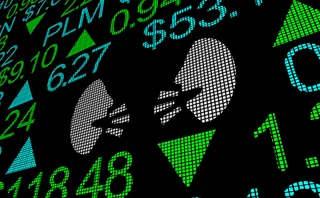Max Bowie: Don’t Be the Fool Parted from Your Money

We all love a bargain—especially when what we receive turns out to be something valuable. But when something seems too good to be true, it probably is. From Bernie Madoff’s Ponzi scheme to newspapers’ city experts who would tip their own stocks, the latest “sure thing” lures people into parting with their money. And after seeing the power of computers to analyze and make money from the capital markets, investors are increasingly placing their trust in software to do the analysis for them. So it was only a matter of time before one of these computers landed in trouble with the regulators.
As a case in point, the Securities and Exchange Commission (SEC) is suing Marl, a stock-picking robot—or rather, its creators, twin brothers Alexander and Thomas Hunter. According to the SEC, Marl never existed, and the brothers persuaded around 75,000 investors to fork over more than $1.2 million to subscribe to recommendations supposedly generated by Marl’s sophisticated analysis, when in fact the stocks they touted were ones they had been paid to hype by stock promoters seeking to drum up volume in thinly traded stocks to offload their own positions.
You might wonder why anyone would fall for such a scheme, which—as elaborately crafted as it was—contained factual claims that could be checked and debunked with a little research. But in today’s fast-paced markets, who wants to spend time doing research when there’s money to be made or lost? And people have placed too much trust in the notion that anything computerized is infallible. True, a spreadsheet may never make an incorrect calculation, but who’s checking whether the data being fed into the spreadsheet is accurate—or that the spreadsheet really exists in the first place?
Mo’ Power, Mo’ Problems
I wrote in a column earlier this year that mobile technologies and “app store”-style software offerings are leading to the “consumerization of Wall Street.” In fact, this trend goes much further: Real-time data, historical charts and sophisticated technical analysis that until recently were reserved for professionals on trading desks are now commonplace in the retail world, via brokerage accounts and even services such as Google, giving everyday investors infinitely more powerful tools—often for free—than were available a few short years ago.
But, as they say, with great power comes great responsibility. And the fact that more information is available to the average investor may create more opportunities, but also makes it exponentially harder for them to determine what sources of information are valuable. For example, according to a recent survey from Recognia, which supplies brokers with technical analysis software that they provide to trading clients, active traders place high value on technical analysis and fundamental analysis—and to a lesser extent, value-based analysis—to support trading decisions.
The survey also suggests that emerging markets are able to harness this “consumerization” of premium technology to leapfrog more developed markets set in their ways. For example, 38 percent of survey respondents were based in the US, compared to 25 percent in India. But whereas 44 percent of US respondents had been trading for more than 10 years, 46 percent of those in India had only been trading for between one and five years. And 54 percent of Indian respondents said technical analysis is most valuable, demonstrating newer investors are also smarter investors, compared to just 22 percent of US respondents, who placed higher value on fundamental analysis.
Too Much Trust?
Are investors placing too much trust in technology? Certainly, any service should deliver what it promises. But as the choices available increase, so do the opportunities for scammers to take advantage of investors. Hence, the role of due diligence—not just on investments themselves, but also on the tools used to identify investments—will become more important, and regulators may find themselves chasing more ghosts of get-rich-quick technologies. Remember, if you can’t spot the sucker at the card table, the sucker is you.
Only users who have a paid subscription or are part of a corporate subscription are able to print or copy content.
To access these options, along with all other subscription benefits, please contact info@waterstechnology.com or view our subscription options here: http://subscriptions.waterstechnology.com/subscribe
You are currently unable to print this content. Please contact info@waterstechnology.com to find out more.
You are currently unable to copy this content. Please contact info@waterstechnology.com to find out more.
Copyright Infopro Digital Limited. All rights reserved.
As outlined in our terms and conditions, https://www.infopro-digital.com/terms-and-conditions/subscriptions/ (point 2.4), printing is limited to a single copy.
If you would like to purchase additional rights please email info@waterstechnology.com
Copyright Infopro Digital Limited. All rights reserved.
You may share this content using our article tools. As outlined in our terms and conditions, https://www.infopro-digital.com/terms-and-conditions/subscriptions/ (clause 2.4), an Authorised User may only make one copy of the materials for their own personal use. You must also comply with the restrictions in clause 2.5.
If you would like to purchase additional rights please email info@waterstechnology.com
More on Trading Tech
Artificial intelligence, like a CDO, needs to learn from its mistakes
The IMD Wrap: The value of good data professionals isn’t how many things they’ve got right, says Max Bowie, but how many things they got wrong and then fixed.
Symphony looks to cloud, AI for enhanced trader voice
The communication and collaboration platform provider is utilizing modern technology to grow its network of services and users.
Observations and lessons to learn from the move to T+1
The next few years will see other jurisdictions around the world look to North America for guidance on transitioning to shorter settlement cycles.
As US options market continued its inexorable climb, ‘plumbing’ issues persisted
Capacity concerns have lingered in the options market, but progress was made in 2024.
Doubts raised over new FX platform disclosures
New disclosure sheet template will require platforms to outline how they charge for data
Expanded oversight for tech or a rollback? 2025 set to be big for regulators
From GenAI oversight to DORA and the CAT to off-channel communication, the last 12 months set the stage for larger regulatory conversations in 2025.
DORA flood pitches banks against vendors
Firms ask vendors for late addendums sometimes unrelated to resiliency, requiring renegotiation
IPC’s C-suite shuffle signals bigger changes for trader voice tech
Waters Wrap: After a series of personnel changes at the legacy provider, WatersTechnology examines what these moves might mean for the future of turrets and trader voice.








